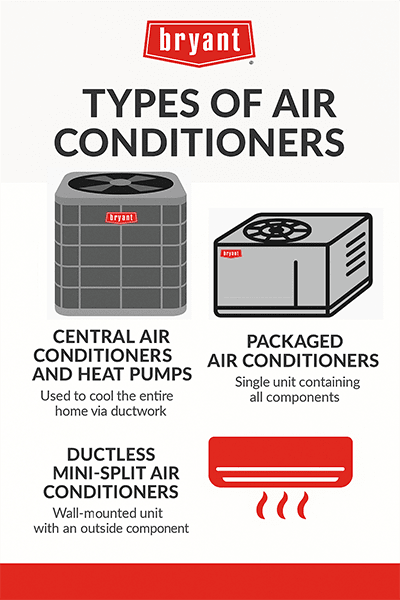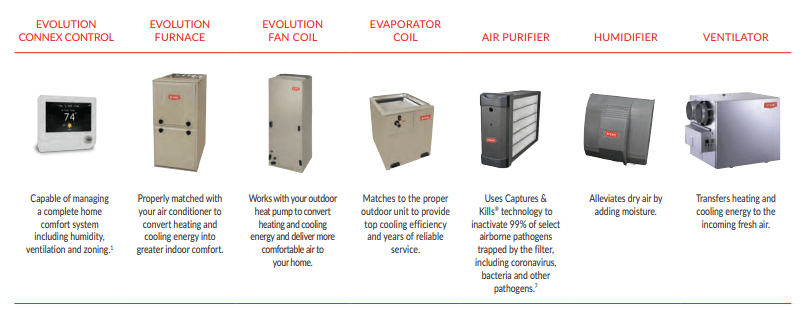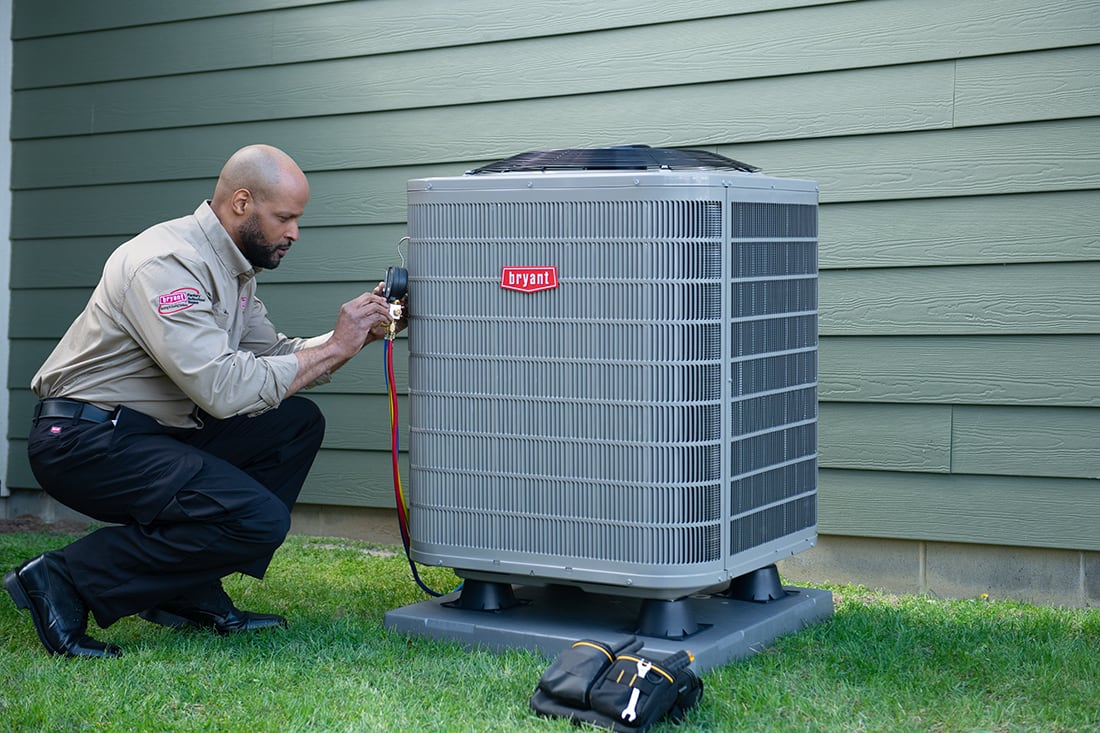About The Author: Travis Baugh is a Digital Brand Marketing Manager for Bryant, where he creates clear, helpful content to guide homeowners through heating, cooling, and indoor air quality decisions. His goal is to empower readers with the knowledge they need to choose the right comfort solutions for their home—confidently and comfortably.
Your Guide To HVAC Units
By Travis Baugh
An HVAC unit is the climate control system responsible for heating, ventilating, and air conditioning your home to maintain comfort year-round. Whether you are upgrading an outdated system or installing a new one, choosing the right equipment is an investment in your home’s long-term efficiency and your family's comfort.
Bryant stands out as a trusted industry leader, offering reliable, energy-efficient options designed to meet modern heating and cooling needs. This guide explores why Bryant is the ideal choice, the different types of systems available, and the key factors you must consider before buying.
Why Choose Bryant for Your HVAC Unit?
Bryant HVAC units are engineered for reliability, durability, and superior energy efficiency. Investing in a Bryant system means choosing technology designed to maximize performance while minimizing utility bills and your carbon footprint.
We prioritize solutions that matter. Rigorously tested to withstand harsh conditions, our units provide reliable performance year after year. With features like the Red Shield warranty on select products and the 100% satisfaction guarantee from Factory Authorized Dealers, we stand firmly behind our technology.
“Make sure you choose the right brand of equipment, like Bryant,” Samantha Houchin, owner of The Weather Changers in Denver, Colorado, said. “Pick a brand that stands behind its products with strong warranties. For example, Bryant offers a Red Shield warranty on several products, and Factory Authorized Dealers provide a 100% satisfaction guarantee.”
Types of HVAC Equipment Systems

There are several types of HVAC equipment systems available, each designed to meet different heating and cooling needs. Understanding the main system types can help you choose the right solution for your home.
Split Systems
Split systems are the most common residential setup, consisting of an outdoor unit (air conditioner or heat pump) and an indoor unit (furnace or fan coil). They are versatile and customizable for homes with existing ductwork.
Packaged Systems
Packaged systems house all heating and cooling components in a single unit, typically installed outdoors on a ro
Ductless Systems
Also known as a mini split system, these units do not require ductwork. They are perfect for room additions, converted garages, or older homes where installing ducts isn't feasible..
Types of HVAC Units
Understanding the different types of HVAC units is crucial for selecting the right system for your home. Bryant offers a range of options to suit various needs and preferences. Here are three popular types of HVAC units:
- Air Conditioners for Whole-House Cooling: Designed to cool your entire home, central air conditioners distribute cool air through a network of ducts. These units provide consistent and efficient cooling throughout the space.
- Furnaces for Whole-House Heating: Designed to heat your entire home, furnaces distribute warm through a network of ducts. They provide consistent warmth during colder months, helping to maintain a comfortable indoor temperature.
- Heat Pumps for Both Heating and Cooling: Heat pumps are versatile units that provide both heating and cooling by transferring heat between indoors and outdoors based on the season. These energy-efficient options can help you save on utility bills. Geothermal heat pumps use the stable temperature of the earth's underground to heat and cool a home.
- Indoor Air Quality Products: Indoor air quality products, such as air purifiers, humidifiers, dehumidifiers, and UV lights are designed to improve the cleanliness and comfort of indoor air. These products help reduce allergens, pollutants, and harmful pathogens, promoting a healthier environment for occupants.

How to Choose the Right HVAC Unit
Selecting the right HVAC unit involves considering several important factors to ensure optimal comfort and energy efficiency. Here are key points to keep in mind:
- Proper Sizing and Capacity: It's essential to choose an HVAC unit that matches the size of your home. An undersized unit may struggle to maintain the desired temperature, while an oversized unit can lead to energy waste and inefficiency. Your local Bryant dealer can perform a load calculation to determine the ideal size and capacity for your home.
- Energy Efficiency: Take a close look at the efficiency ratings of your unit. Higher ratings indicate better energy conversion, leading to greater savings on heating and cooling bills over time.
- SEER2 (Seasonal Energy Efficiency Ratio): SEER2 measures the cooling efficiency of an air conditioning system over an entire cooling season, with a higher SEER indicating better energy efficiency.
- EER2 (Energy Efficiency Ratio): EER2 measures the efficiency of an air conditioner or heat pump at a specific temperature, indicating how well the system uses energy to cool the space.
- HSPF2 (Heating Seasonal Performance Factor): HSPF2 measures the efficiency of a heat pump's heating function over a full heating season, with a higher HSPF showing greater efficiency.
- AFUE (Annual Fuel Utilization Efficiency): AFUE measures the efficiency of a furnace in converting fuel to heat, with a higher AFUE rating indicating less energy waste and better performance.
- Additional Features and Smart Controls: Consider units with advanced features like programmable thermostats, zoning capabilities, and air purification systems. These features enhance comfort, convenience, and indoor air quality, making your HVAC system more versatile and efficient.
- Cost and Budget: Factor in both upfront costs and long-term operating expenses. High-efficiency systems may have higher initial costs but can provide savings over time through reduced energy consumption.
- Noise Levels: Check the noise level ratings, especially if the HVAC unit will be installed in a living or sleeping area. Quieter units offer more comfort and less disruption. Noise level for HVAC systems is measured in decibel rating. A great decibel rating is in the 50s, a good decibel rating is in the 60s, and a standard decibel rating is in the 70s.
- Warranty and Maintenance: A strong warranty is crucial when choosing an HVAC system, as it provides peace of mind by covering potential HVAC repair or replacement costs in case of system failure. A comprehensive warranty ensures that parts are covered for an extended period, helping to protect your investment and reduce unexpected expenses. Learn more about the warranty of Bryant products.
By considering these factors, you can make an informed decision and select an HVAC unit that meets your specific requirements. Bryant offers a wide range of HVAC equipment designed to provide optimal comfort, energy efficiency, and reliability. Explore our selection today to find the perfect HVAC unit for your home.
“Modern HVAC systems have so much amazing technology and great options for homeowners,” Houchin said. “You can fix those problem spots and finally enjoy consistent comfort throughout your home.”
Maintenance and Care for Your HVAC Unit
Proper maintenance and care are crucial to ensure the optimal performance and how long your HVAC system works. Here are some essential HVAC maintenance tips:
- Regular Filter Cleaning and Replacement: Filters trap dust, dirt, and airborne particles, preventing them from entering your system. Over time, these filters can become clogged, reducing airflow and causing your unit to work harder. Replace filters every 1-3 months, depending on usage and filter type.
- Annual Professional Maintenance: Schedule annual maintenance with a trained HVAC technician to inspect your unit, clean the coils, check for refrigerant leaks, and ensure all components are functioning properly. Professional maintenance improves performance and helps identify potential issues before they become major problems.
Connect With A Bryant Dealer On HVAC Equipment
Connect with a Bryant dealer to explore a wide range of HVAC equipment and units tailored to your home’s needs. Their experts can help you choose the right system, whether you're upgrading an existing unit or installing a new one, and provide professional guidance on energy efficiency, maintenance, and HVAC installation. Schedule an appointment with your local Bryant dealer today for personalized solutions and reliable HVAC service.

HVAC Unit FAQs
An HVAC unit is the system responsible for heating, ventilating, and air conditioning your home, maintaining indoor comfort year-round through temperature and airflow control.
AC refers specifically to air conditioning, while HVAC is a broader term that includes heating, ventilation, and cooling systems, covering your home's entire climate control system.
A typical HVAC unit costs between $5,000 and $20,000, depending on the system size, type, efficiency, and whether both heating and cooling components are being replaced. It’s best to talk to your local Bryant dealer to get an accurate quote.
Learn More About HVAC
- Discover what is HVAC
- Read our guide on HVAC replacement
- Check out our HVAC pricing guide
- Understand HVAC zoning systems
- Explore HVAC options for old houses


